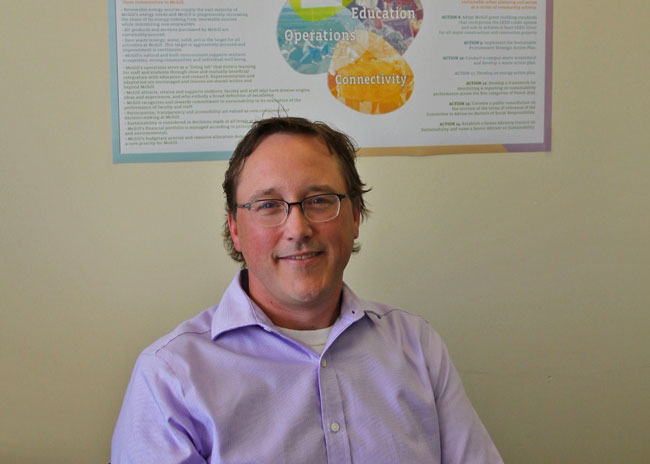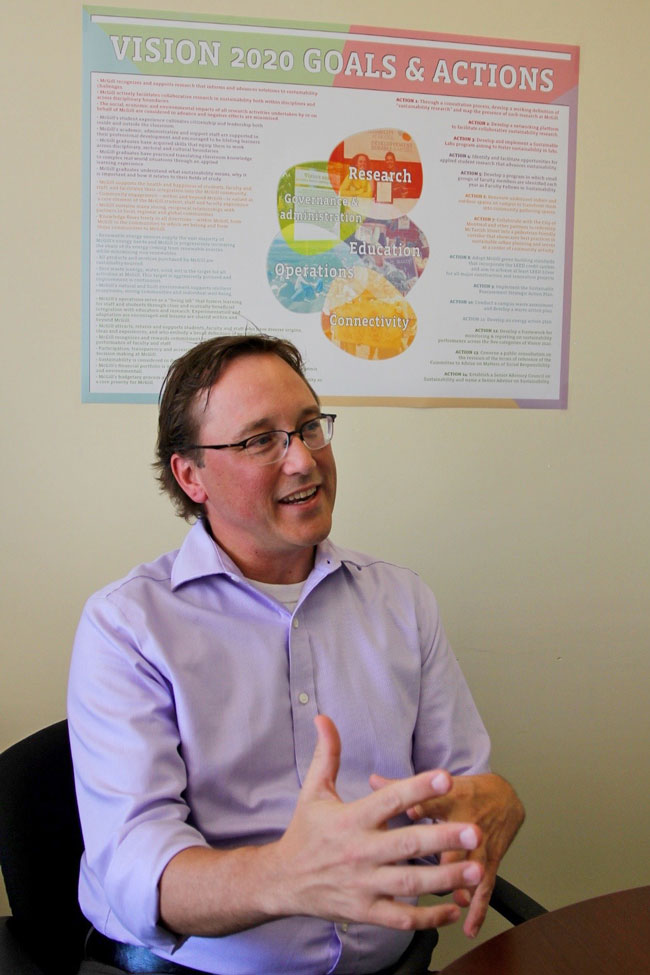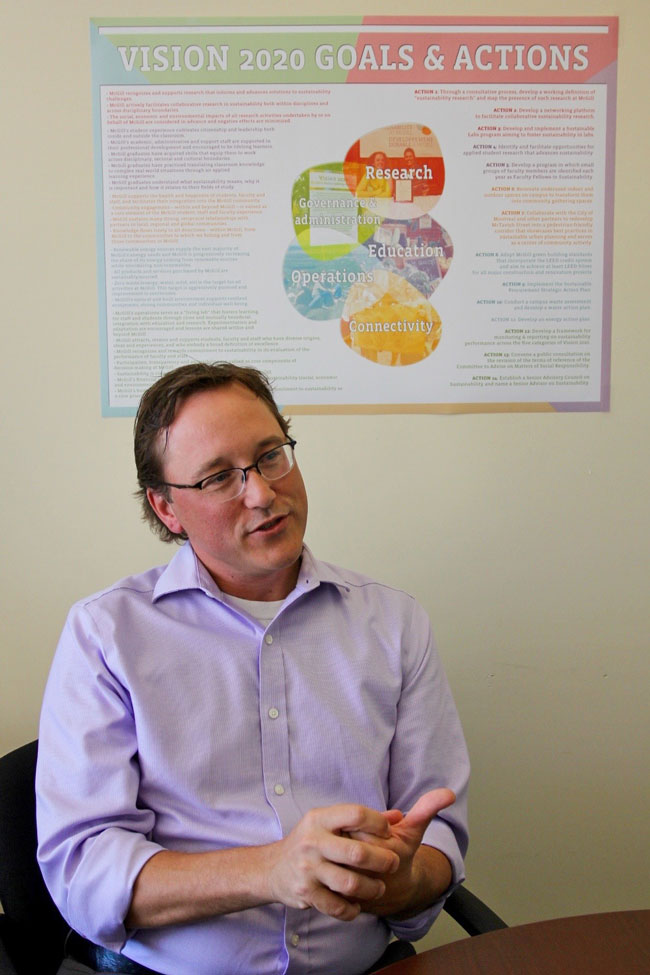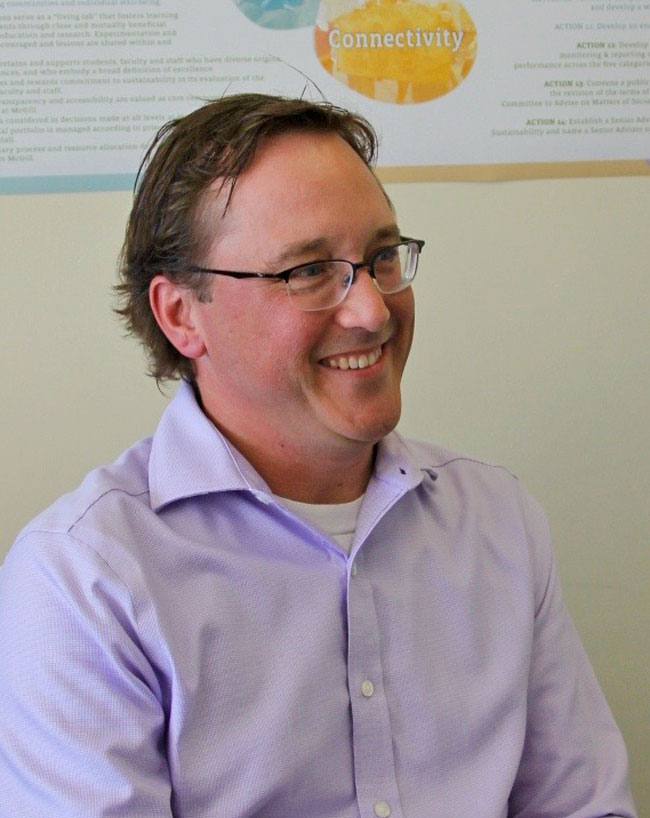
By Neale McDevitt
When François Miller took over the position of Manager of the Office of Sustainability, he had high expectations. And why not? As the unit leader of the City of Montreal’s Sustainable Development Division (Miller’s job before coming to McGill), he helped implement the City’s first sustainability plan, building it from the ground up. But coming to McGill this past spring, he knew that the University was already well on its way to finalizing its own sustainability blueprint through the Vision 2020 initiative.
His only question upon arrival was ‘Where is everybody?’
“At first I found it a little quiet,” Miller says with a laugh, “but I realized it was because most of the students – who have traditionally driven sustainability efforts at McGill – were busy with exams. Of course exams are long over, the new semester is here and it isn’t so quiet any more.”
Recently, Miller sat down with the Reporter to talk about his mandate, the Sustainability Projects Fund (SPF), Vision 2020 and his plans to further grow the culture of sustainability at McGill.
When you arrived on campus, what were your first impressions of the University’s sustainability efforts?
Honestly, I was really impressed at the number of people who were involved in the sustainability movement. This really is the legacy of Vision 2020 because the whole process was designed to bring people together to build a shared vision for the future. People have bought into that process and they’ve embraced that vision. What was once primarily a student-driven effort has grown to include many members of our faculty and staff.
I was also impressed with the variety of units contributing to the sustainability efforts. This goes right across faculties and departments. It is a University wide movement.
 You mentioned how quiet students were when you first arrived because they were busy with exams. What about now?
You mentioned how quiet students were when you first arrived because they were busy with exams. What about now?
As soon as students began arriving on campus in September, I could feel their energy. Right now I’m meeting with them on a regular basis and listening to their expectations for McGill. I’m also interested in the ideas of staff and faculty members to make our organization greener, healthier, more sustainable.
It seems like every year, sustainability efforts at the University are becoming more comprehensive. Have we reached a point where we can say this is part of McGill’s culture?
I know that in the early days the movement was driven by a small number of highly motivated people. But it’s clear that it has grown much larger than that and I sense that it is more and more embedded in the day-to-day operations of the University. This gradually becomes the way we do business at McGill.
Where are we with Vision 2020?
We are currently finalizing a mid-way progress report – a report we will release very soon. There were 14 actions and 56 deliverables laid out in Vision 2020. Various units were responsible for the implementation of these actions. Right now we’re evaluating where we stand for each of the deliverables and I can tell you we are pretty much right on track.
When you were working for the City, you helped develop the first sustainability plan. How difficult was it to get buy-in?
It was a unique plan because we didn’t want the initiatives to come only from the City. We challenged different partners to do the same and take concrete commitments.
In the beginning, in 2005, there were 48 organizations onboard. By 2014, we had more than 250 organizations participating. When you get that kind of buy-in over such a long period, you know you are working on issues that matter to people and organizations.
Are there similarities between the work you were doing at a municipal level and the work you’re doing here at McGill?
The main similarity is that both the City of Montreal and McGill are fairly decentralized organizations. You can compare McGill’s faculties with the City’s boroughs.
They are also both very complex organizations and one has to be aware of the complexity in order to push forward the sustainability agenda.
Also, at the municipal level, it is mostly the citizens pushing the sustainability efforts forward through their elected officials. It is very similar to McGill where we see the students as one of the major stakeholders pushing the sustainability agenda.
Any differences?
I have a feeling that I will be able to see results more quickly and more clearly here because of the scale of both campuses.
 Tell us about the Office’s success stories?
Tell us about the Office’s success stories?
To me the biggest success story is without a doubt the Sustainability Project Fund (SPF), which was implemented 2010.
What is amazing about the SPF is the partnership philosophy that has been established between the students and the administration. It translates in a 50/50 contribution to the fund, a 50/50 representation on the Working Group (the body responsible for decision making), and 50/50 attribution of the funds between student led projects and faculty-staff led projects.
The impact of the SPF has been incredible. Around $4.5 million has been awarded for sustainability related projects in the last five or six years. It’s not just people talking about sustainability or coming up with good ideas – we actually have the means to implement those ideas in concrete projects.
What kind of projects are we talking about?
Some of these projects are well established. This includes initiatives like McGill Feeding McGill Project and Edible Campus – which people see every day as they walk through the downtown campus.
There is also the Anti-Oppression Program, given to new students through Residences. So far more than 3,000 students have had workshops on issues of race, religion, culture, mental health and coping, etc.
The latter program broadens the definition of sustainability, doesn’t it? So many people think that sustainability is composting and recycling but the SPF brings sustainability to almost every aspect of life on campus.
I’m very pleased with the emphasis that the Office puts on the social side of sustainability. To me it really shows that the movement has grown beyond just the “green” side of sustainability. We’re expanding our horizons and trying to understand the connections between the environmental, social and economic aspects of an issue. I think that when we focus on those connections, we truly focus on sustainability.
Where does the Office of Sustainability fit into all this?
We have a number of responsibilities, always with an eye on making McGill more sustainable in everything it does.
On top of managing the SPF, we’re trying to get people involved, motivated and excited about Vision 2020 and beyond.
One way we do this is to host Sustainability Fridays. The last Friday of every month, we invite members of the McGill community to the Faculty Club so that people can come and chat about sustainability – no agenda, just an informal discussion.
 Climate change is always a hot-button issue and there is an international climate conference coming up in Paris. Does McGill have a role to play leading up to the conference?
Climate change is always a hot-button issue and there is an international climate conference coming up in Paris. Does McGill have a role to play leading up to the conference?
I think there are three aspects to the role that McGill can play.
Obviously, the first is related to McGill being a research-intensive university. We have top-of-the-line researchers who are concentrating on climate change issues every day.
But there is also an educational component. Well-known researchers like Nigel Roulet and Catherine Potvin are able to raise the public’s awareness of the scientific aspects of climate change and how these can translate into policy.
As well, we are educating the leaders of tomorrow in the classroom and beyond. If we can build climate change awareness into some of their classroom activities, then they will carry these lessons with them into the workforce.
Finally, we play an important role in the way we do business at McGill. We have to be a leader in terms of reducing our carbon footprint – especially in terms of energy management and eventually air travel. We are well positioned when we compare ourselves to other universities and many dedicated people at McGill are already working hard on this issue. In fact, we already reduced our greenhouse gas emission by nearly 1/3 since 2002.
What does the coming year hold for the Office of Sustainability?
We will release the Vision 2020 progress report, but we also want to begin on the 2017–2020 action plan over the winter to continue charting the University’s path toward sustainability.
How will you develop this action plan?
The next Vision 2020 push will be modelled very much after the last one. Most of all, we want to involve McGillians as much as possible because one of the key factors for the success of Vision 2020 was the input we got from so many different people. Who better knows what needs to be done than the people who study and work here every day?
It sounds like you have some big days ahead of you. You might be yearning for those quiet days last spring.
I’m really excited about this challenge. To be honest, I was looking forward to rolling up my sleeves and really get started. And it has started indeed. [laughing]
